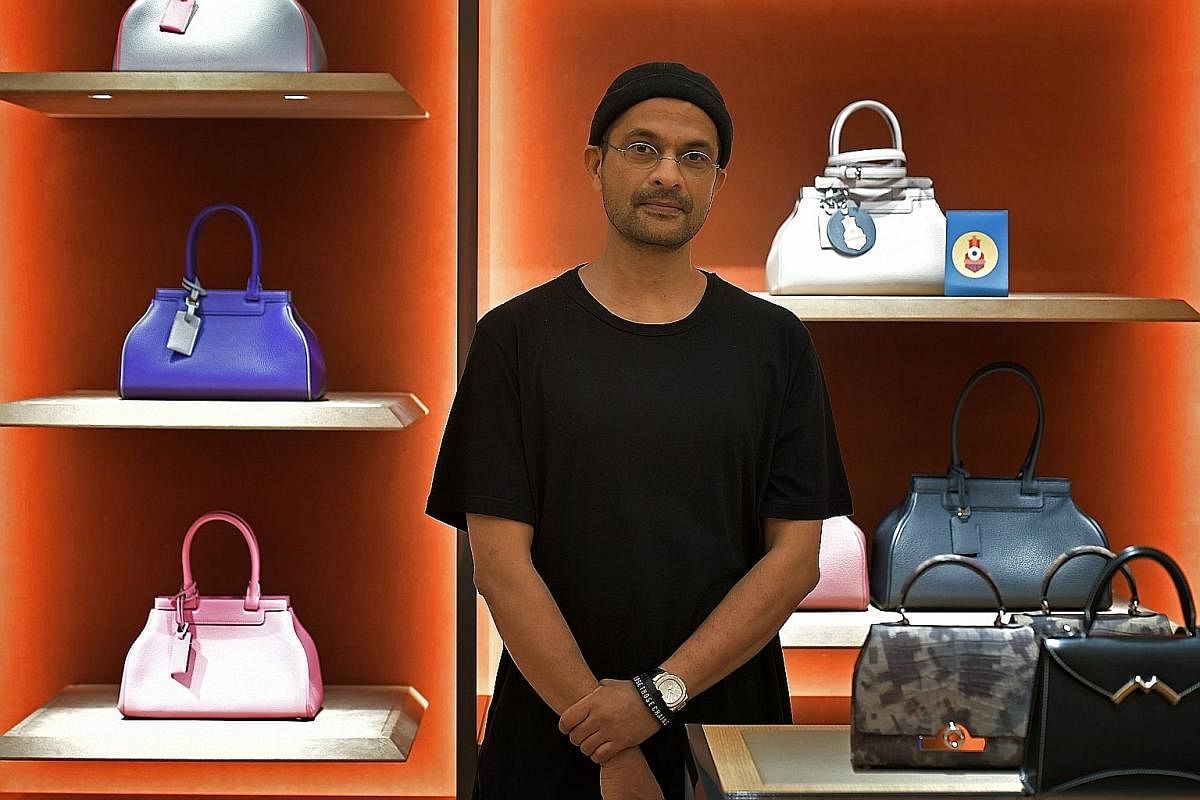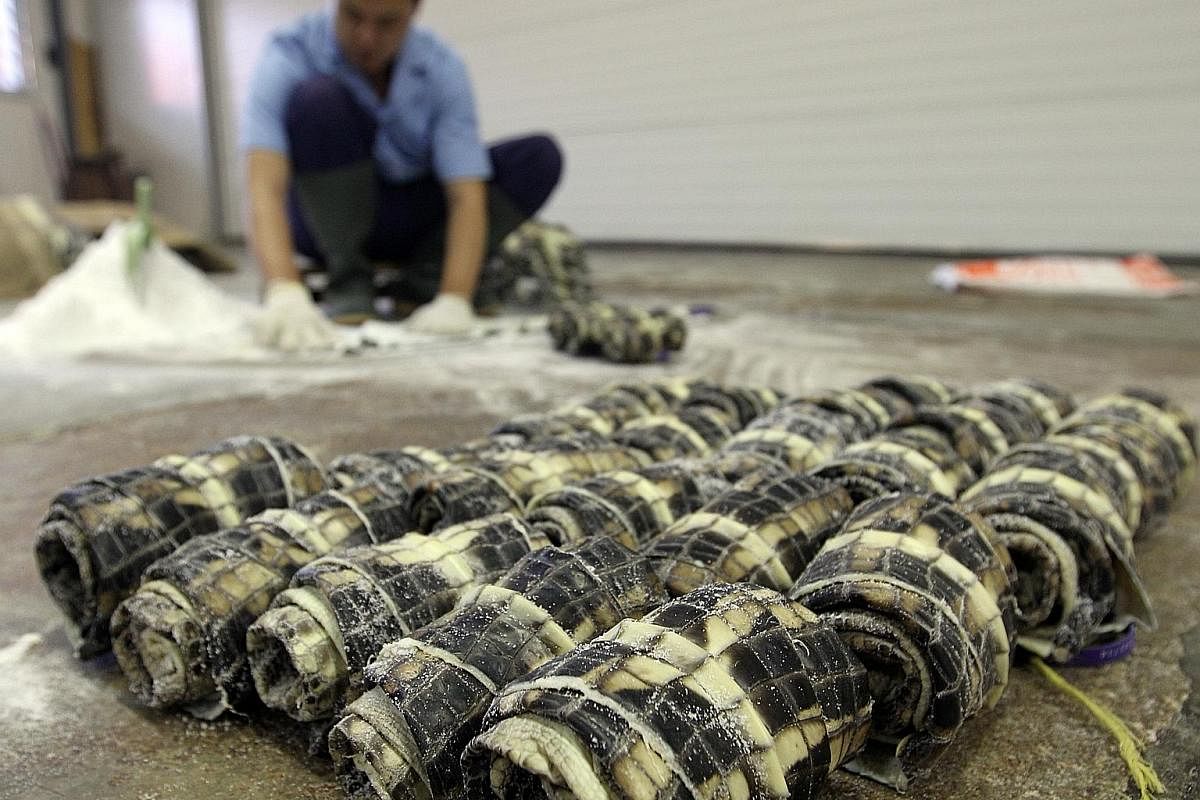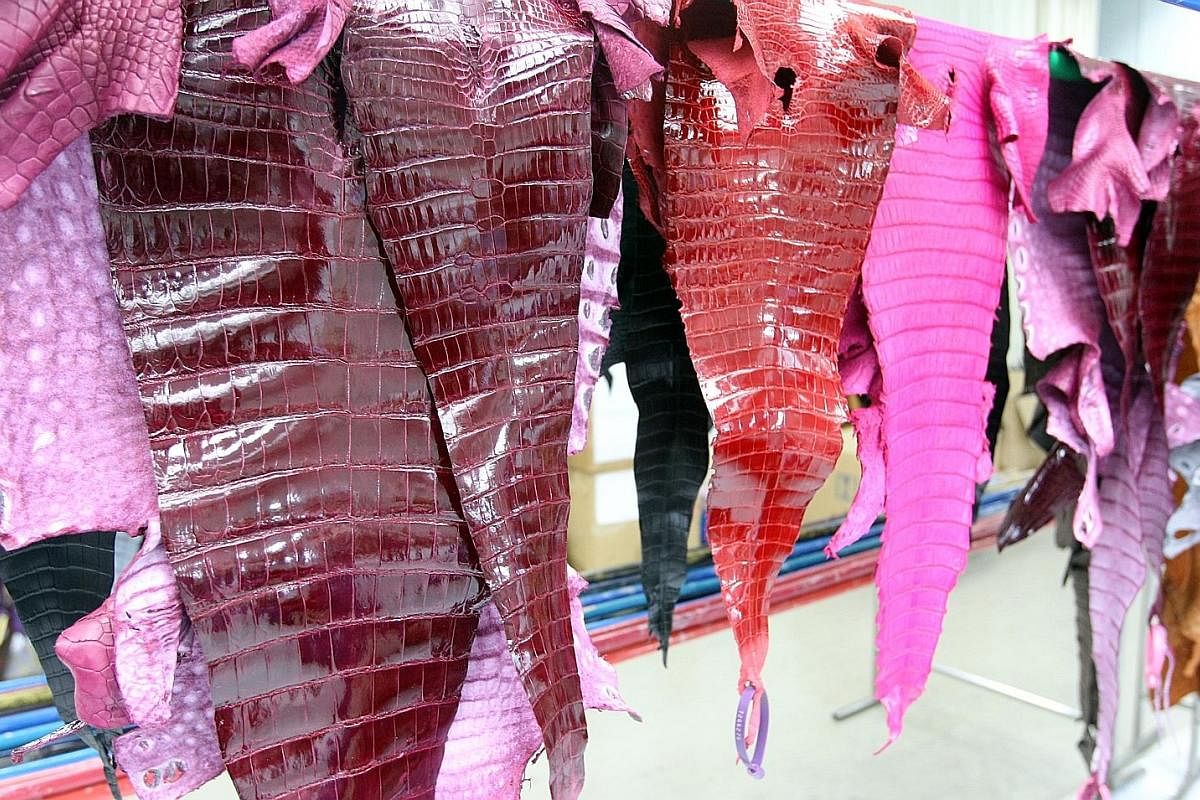-

Rejane, $50,820Moynat's most popular bag is offered in a Crocodile Ceramique design exclusively to Singapore customers. Made to order, it comes in two colours, Cobalt and Celadon, and has a waiting time of approximately six months.
Luxury goods brand Moynat lauds Defu Lane tannery
French luxury bag brand Moynat's creative director experiments and does 'crazy things' at Heng Long Leather tannery and lauds its craftsmanship



In a little corner of an industrial estate in Hougang, there is a reptile skin tannery. For the past three decades, it has been supplying the world's biggest European luxury brands, such as Christian Dior and Prada, with top-grade crocodile and alligator skins.
This is where Ramesh Nair, creative director of French leather goods luxury brand Moynat, likes to potter around whenever he is in Singapore.
Heng Long Leather tannery in Defu Lane is his playground. Here, "I experiment and do really crazy things", says the Kerala-born 52-year-old, who is based in Paris and is responsible for the design of the brand's products. He oversees everything from the selection of materials to the colours and construction of the bags.
As to what exactly these crazy experiments entail, he is deliberately coy, choosing only to speak cryptically of "smoked crocodile" and "tomatoes with three heads". But his Instagram account (@nair348) has a photo, geotagged in Defu Lane, of a beaker full of blue dye marked "testing lab", some stencils and a white crocodile skin stained blue with patterns.
"The reason I enjoy coming here is the people. They are very open to ideas," he says.
There is a sense that whatever goes on behind Heng Long Leather's closed doors is of the top secret "if I told you I'd have to kill you" variety.
But what is clear is that Nair, who has previously been a designer for brands including Hermes, Christian Lacroix and Yohji Yamamoto, has a deep appreciation for a part of Singapore that most Singaporeans are not even aware of. "There are things about Singapore that we should be really proud of. This tannery is one of those," he says earnestly.
"This tannery, for me, was a revelation because they have a (special) kind of craftsmanship, a way in which they prepare the skins. Singapore has this amazing tradition that is very, very old. It is one of the most amazing tanneries in the world."
Nair visits Singapore every three months or so, staying a week or longer each time. At the new Moynat boutique in Ngee Ann City, which opened in July, he tells The Straits Times that about half of Moynat's crocodile goods come from Singapore.
"We work with three suppliers worldwide - Heng Long in Singapore and the other two in France, all at the finest level of quality in their field. Moynat's choice is based on the speciality of each supplier and what I am looking for in terms of design and the specific type of skin," he says, adding that the tannery here specialises in crocodile and alligator skin.
The percentage of crocodile skin items offered by the brand varies according to demand.
Moynat's most popular bag, the Rejane, is being offered in a Crocodile Ceramique design exclusively to Singapore customers. It is made-to-order; comes in two colours, Cobalt and Celadon; has a waiting time of approximately six months; and costs $50,820.
Heng Long Leather, which has been honing its expertise in drying, tanning and dyeing crocodile and alligator hides since 1977, is such a globally prized supplier of exotic skins that it was acquired in 2011 by French luxury goods conglomerate LVMH Moet Hennessy Louis Vuitton in a deal worth $161 million.
Moynat is a storied Parisian brand that LVMH's chief executive officer, Mr Bernard Arnault, acquired the rights to in 2010, handpicking Nair to serve as creative director.
Crocodile hide, says Nair, is "the most difficult material to work with". "It is the ultimate complication... Very few artisans are able to work crocodile and it takes two to three times more time to fashion the bags than with normal leather. This is why the demand for our crocodile is higher than what we can produce."
Therein, he says, lies the material's allure. "I used to do clothes and I had a huge preference for very, very fine silks - organza and things like that. I used to always wonder why I gravitated towards that, rather than cotton or canvas, which were so easy. I discovered that when you have a challenge, it's much more intriguing than to do something simple."
Because each of his bags requires a high level of skilled craftsmanship, he thinks luxury is defined by scarcity. And he is not talking about artificially engineered scarcity, where brands release limitededition merchandise to keep supply less than demand, for instance.
"If I go to the tannery and I know that there are only five skins that I can buy, then I pay more attention to the skin than if I had 500," he adds. Luxury, he says, "actually doesn't exist" - it is a relative concept. "If you go to the Sahara, a bottle of water is luxury."
This is why the brand - and Nair himself, who is always dressed in plain T-shirts because shirts and ties make him feel "stifled" - finds quiet confidence in being low-key. "I was invited to go to the Singapore Cricket Club and you are supposed to wear a collared shirt, so I didn't go in. Because it's against my principles to compromise," he chuckles.
But being understated does not mean that Moynat is complacent. In six years, it has opened 16 boutiques in 10 cities, including Singapore. Its flagship boutiques stand on the Rue Saint-Honore in Paris, Madison Avenue in New York City and Mount Street in London's Mayfair.
It has not always been a smooth ride.
Moynat was established in Paris in 1849, predating fellow malletiers Louis Vuitton and Goyard. Founding designer Pauline Moynat built her brand designing luggage. Her signature products were curved trunks that could sit snugly on the roofs of cars for glamorous road trips. Moynat soon became a favourite of Comedie-Francaise celebrities including stage and silent film actress Gabrielle Rejane, after whom the Rejane bag is named.
However, in 1976, the boutique closed its doors and the brand disappeared off the face of the Earth for 35 years. It is not known why.
Nair, then, is the Prince Charming to Moynat's Sleeping Beauty. He quite literally resurrected the brand, building an arsenal of products based on images from old posters and the remnants of Moynat items he could find at flea markets.
The more he uncovered of the brand's history, the more it gave him "the heebie jeebies", he says, because he could identify so strongly with the fabled Pauline Moynat's story. "It's easy for us to talk about women's rights and equality now, but in the 1800s, it was not the same for women. She came to Paris to, like what we hear in fairy tales, 'seek her fortune'. In a time when there were men handling this kind of business - Mr Vuitton and Mr Goyard and Mr Hermes... she must have been something."
It is almost a mirror-image of his own story: 18 years ago, he moved to Paris from India to seek his fortune in fashion.
His Asian heritage permeates every part of his creative process as a designer. Growing up, "there were a lot of things we didn't have," he says. "We would find ways and means to get them. I used to love playing cricket, but there were times when there were no cricket bats, so we would chop coconut leaf stems up to make cricket bats."
Asians, in particular Singaporeans, were some of the first people to take an interest in Moynat when it opened its store in Paris in 2011.
"I very clearly remember coming downstairs and meeting this lady who said she was from Singapore. And I was like, 'Wow, it's so nice to meet somebody from Asia'," he says. "We had the Americans, we had the French and the third nationality that actually started buying from us was Singaporeans." That is "mindblowing", he says, considering the country's size.
Singaporeans, he says, recognise the quality and make of the goods. "They question right away: 'Where did you find this leather? What is it all about?'" he says. "They are very adventurous and very modern."
In the light of this, he says he is surprised it took so long for the brand to open a boutique here, but thinks it was a matter of finding the right space.
A spokesman for Moynat says sales here have "well exceeded" expectations and that half of the clientele at the Singapore store have been local.
Apart from custom orders, customers at the Singapore store can also take advantage of Moynat's signature personalisation services.
There are two types: Hot stamp embossing and painting by hand. The latter, which is not as commonly offered by other brands as hot stamping, is done by an artist in Paris and takes two to three weeks to complete. Initials, for instance, can be hand-painted onto items. Prices start from $270 for one letter on canvas and go up to $1,950 for artistic personalisation on leather.
When The Straits Times visited the boutique earlier this month, one of the bags on display had a small painting of a Merlion against a typical Parisian street sign reading "Rue Saint-Honore".
If the Merlion could pack its bags and travel, well, it probably would not mind toting a carry-on likely to have its origins in a Defu Lane tannery.
Join ST's Telegram channel and get the latest breaking news delivered to you.
A version of this article appeared in the print edition of The Straits Times on September 28, 2017, with the headline Luxury goods brand Moynat lauds Defu Lane tannery. Subscribe
